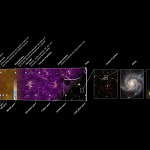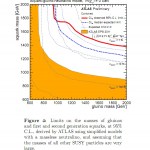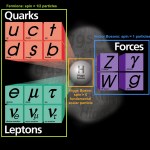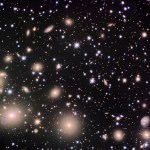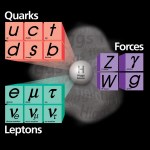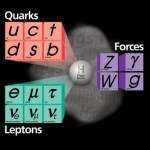Standard Model
“Faultily faultless, icily regular, splendidly null, dead perfection; no more” -Lord Alfred Tennyson
Ahh, the Standard Model of elementary particles and their interactions. It's right up there with General Relativity -- our theory of gravitation in the Universe -- as the most successful physical theory of all-time.
Image credit: DoE, NSF, LBNL, and CPEP, via http://www.cpepphysics.org/.
While General Relativity describes the relationship between matter-and-energy and spacetime, the Standard Model describes all the known particles in the Universe and how they interact with one another…
"The joy of life consists in the exercise of one's energies, continual growth, constant change, the enjoyment of every new experience. To stop means simply to die. The eternal mistake of mankind is to set up an attainable ideal." -Aleister Crowley
But the Universe itself experiences continual growth, constant change, and new experiences all the time, and it does so spontaneously.
Image credit: ESA and the Planck collaboration.
And yet, the better we understand our Universe -- what the laws are that govern it, what particles inhabit it, and what it looked/behaved like farther and…
“Supposedly she’d died, but here she was again–somewhat changed, but you couldn’t kill her. Not when the truest part of her hadn’t even been born.” -Denis Johnson
Over the past 100 years, our picture of the Universe has changed dramatically, on both the largest scales and the smallest.
Image credit: Richard Payne.
On the large-scales, we've gone from a Newtonian Universe of unknown age populated only by the stars in our own Milky Way to a Universe governed by General Relativity, containing hundreds of billions of galaxies.
Image credit: Rhys Taylor, Cardiff University.
The age of this…
"If you're a reporter, the easiest thing in the world is to get a story. The hardest thing is to verify. The old sins were about getting something wrong, that was a cardinal sin. The new sin is to be boring." -David Halberstam
It was only a few months ago that both collaborations at the Large Hadron Collider in CERN -- CMS and ATLAS -- announced the discovery of a new particle at about 125-126 GeV of energy: something that looked an awful lot like what the Standard Model predicted the Higgs Boson should be.
Image credit: the CMS detector at CERN, 2009.
This was the result of decades of…
"...this consensus has been brought about, not by shifts in philosophical preference or by the influence of astrophysical mandarins, but by the pressure of empirical data." -Steven Weinberg
One of the most fundamental questions we could ever ask about all of existence is "What makes up the Universe?"
Image credit: Misti Mountain Observatory.
I don't mean "stars and galaxies," like you see above. That might make up the Universe on the largest scales, but that's taking a look at the question of what the fundamental constituents of the Universe compose themselves into.
The other side of the…
"This is evidently a discovery of a new particle. If anybody claims otherwise you can tell them they have lost connection with reality." -Tommaso Dorigo
You've probably heard the news by now: the Higgs boson -- the last undiscovered fundamental particle of nature -- has been found.
The fundamental types of particles in the Universe, now complete.
Indeed the news reports just keep rolling in; this is easily the discovery of the century for physics, so far. I'm not here to recap the scientific discovery itself; I wrote what to expect yesterday, and that prediction was pretty much exactly what…
"Give me a coin. <Takes Coin.> All right. Uh... heads, I win, tails, you lose. Right? <Flips coin.> Tails, you lose." -Ralph Kramden
All things being equal, you're well aware that if you flipped a completely fair coin, you'd have a 50% chance of it landing on heads, and a 50% chance of landing on tails (ignoring the side, of course).
Image credit: C. Nolan, A. Eckhart and Warner Bros. Pictures, retrieved from http://explow.com/Two-Face.
So let's imagine that you flip the coin ten times, and you get seven heads and three tails. Are you worried? You shouldn't be; in…
"...the publisher wouldn't let us call it the Goddamn Particle, though that might be a more appropriate title, given its villainous nature and the expense it is causing."
-Leon Lederman, author of The God Particle
The Higgs Boson: you know the deal. It's the last undiscovered particle in our current picture of all the fundamental particles in the Universe.
Image credit: Fermilab, retrieved from eurekalert.org.
If we can find it, we'll either have a big clue as to what the next step to take in physics will be, or we'll be forced to admit that physics works too well, and many of the great…
The Higgs Boson, an elementary particle thought to give mass to all other particles, remains an elusive final piece of the Standard Model of physics. On The Weizmann Wave, Professor Eilam Gross writes "many scientists believe that the Standard Model will stand or fall on the discovery of Higgs boson particles or proof that they don't exist." Titanic efforts at the Large Hadron Collider over the last year have been geared toward observing the Higgs, but despite suggestive data released on Tuesday, the indisputable remains out of reach. Kostas Nikolopoulos writes on Brookhaven Bits &…
In comments to yesterday's post about precision measurements, Bjoern objected to the use of "quantum mechanics" as a term encompassing QED:
IMO, one should say "quantum theory" here instead of "quantum mechanics". After all, what is usually known as quantum mechanics (the stuff one learns in basic courses) is essentially the quantization of classical mechanics, whereas QED is the quantization of classical electrodynamics, and quantum field theories in general are quantizations of classical field theories. I think saying "quantum mechanics" when one talks about something which essentially has…

